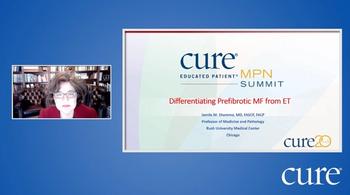
Watch Dr. Jamile Shammo, from Rush University Medical Center, discuss differentiating an essential thrombocythemia diagnosis, during the CURE Educated Patient MPN Summit.

Watch Dr. Jamile Shammo, from Rush University Medical Center, discuss differentiating an essential thrombocythemia diagnosis, during the CURE Educated Patient MPN Summit.

Watch Dr. Jamile Shammo, Dr. Angela Fleishman and Kapila Viges answer questions about clinical trials during the CURE Educated Patient MPN Summit.
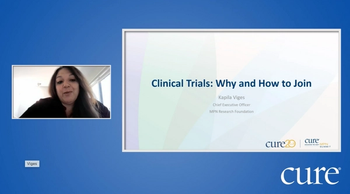
Watch Kapila Viges, from the MPN Research Foundation, discuss clinical trials, during the CURE Educated Patient MPN Summit.
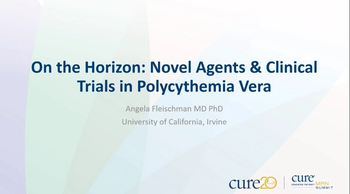
Watch Dr. Angela Fleishman, from the University of California Irvine, discuss novel agents and clinical trials in polycythemia vera, during the CURE Educated Patient MPN Summit.
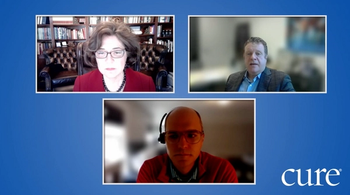
Watch Dr. Jamile Shammo, Dr. Aaron Gerds and Dr. Bart Scott, answer questions during the diagnoses and treatment panel during the CURE Educated Patient MPN Summit.
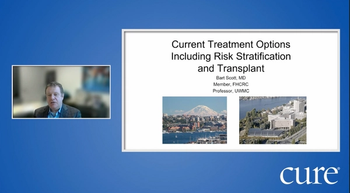
Watch Dr. Bart Scott, from Fred Hutchinson Cancer Center, discuss current treatment options, during the CURE Educated Patient MPN Summit.
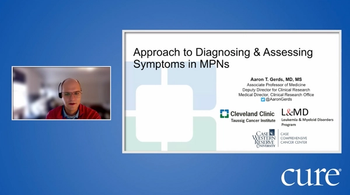
Watch Dr. Aaron Gerds, from Cleveland Clinic Taussig Cancer Institute, discuss approaches to diagnosing and assessing symptoms, during the CURE Educated Patient MPN Summit.
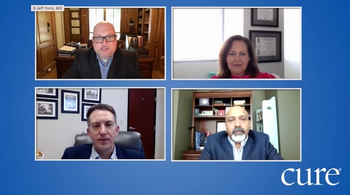
Watch Dr. Thomas Hutson, Dr. Saby George, Dr. Jeff Yorio and Louise Gunter answer questions about combination therapy, during the CURE Educated Patient Kidney Cancer Summit.
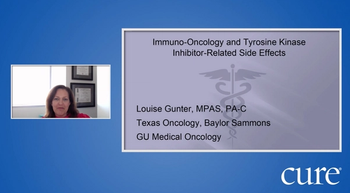
Watch Louise Gunter, from Texas Oncology, discuss IO/TKI-related side effects, during the CURE Educated Patient Kidney Cancer Summit.
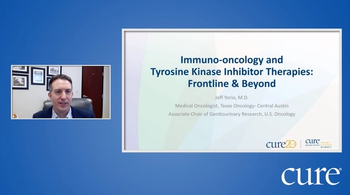
Watch Dr. Jeff Yorio, from Texas Oncology, discuss treatment with the combination of immunotherapy and tyrosine kinase inhibitors, during the CURE Educated Patient Kidney Cancer Summit.
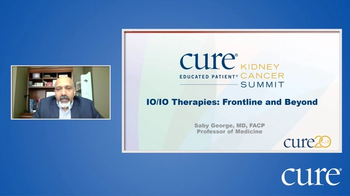
Watch Dr. Saby George, from Roswell Park Comprehensive Cancer Center, discuss treatment with the combination of immunotherapies, during the CURE Educated Patient Kidney Cancer Summit.

Watch Dr. Thomas Hutson, Louise Gunter and Meryl Uranga discuss communicating with a care team about treatment with immunotherapy combined with tyrosine kinase inhibitors, during the CURE Educated Patient Kidney Cancer Summit.

Watch Dr. Thomas Hutson, Louise Gunter and Meryl Uranga discuss side effects and dose reductions after treatment with immunotherapy combined with tyrosine kinase inhibitors, during the CURE Educated Patient Kidney Cancer Summit.

Watch Dr. Thomas Hutson, Louise Gunter and Meryl Uranga discuss the treatment of combining immunotherapy with tyrosine kinase inhibitors, during the CURE Educated Patient Kidney Cancer Summit.
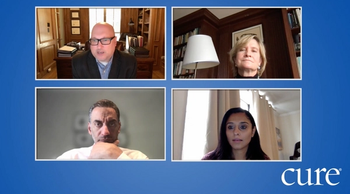
Watch Dr. Thomas Hutson, Dr. Jose Karam, Dr, Naomi Haas, and Kiran Kehoe answer questions about frontline therapy during the CURE Educated Patient Kidney Cancer Summit.

Watch Dr. Naomi Haas, from Abramson Cancer Center, discuss adjuvant therapy options, during the CURE Educated Patient Kidney Cancer Summit.
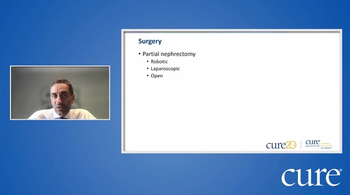
Watch Dr. Jose Karam, from The University of Texas MD Anderson Cancer Center, discuss surgical options, during the CURE Educated Patient Kidney Cancer Summit.

Watch Dr. Vitaly Margulis, Dr. Rana Mckay and Kwame Garrett-Price answer questions about kidney cancer diagnoses during the CURE Educated Patient Kidney Cancer Summit.
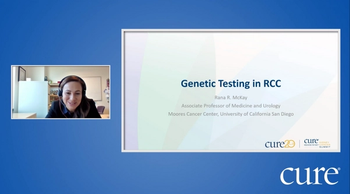
Watch Dr. Rana R. McKay, from the University of California San Diego, discuss genetic testing in renal cell carcinoma during the CURE Educated Patient Kidney Cancer Summit.

Watch Dr. Vitaly Margulis, from UT Southwestern Medical Center, discuss staging, during the CURE Educated Patient Kidney Cancer Summit.
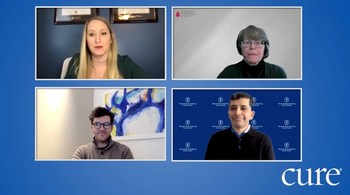
Watch Kristie L. Kahl, with Sham Mailankody, MBBS; Cesar Rodriguez, MD; and Lynn Steele, discuss new therapies on the horizon, during the CURE Educated Patient Multiple Myeloma Summit.
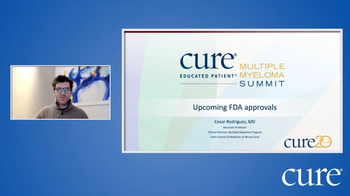
Watch Dr. Cesar Rodriguez, of the Multiple Myeloma Program at the Ichan School of Medicine at Mount Sinai, discuss upcoming FDA approvals in the space, during the CURE Educated Patient Multiple Myeloma Summit.
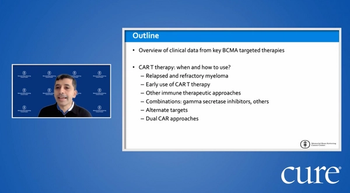
Watch Dr. Sham Mailankody, from Memorial Sloan Kettering Cancer Center, discuss CAR and BiTE therapy, during the CURE Educated Patient Multiple Myeloma Summit.
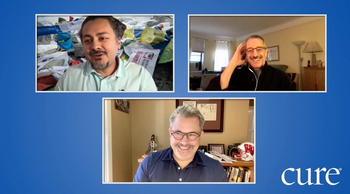
Watch Dr. Saad Z. Usmani, Dr. Ben Marcus and Stan Wagner discuss their participation in the Moving Mountains for Multiple Myeloma program, during the CURE Educated Patient Multiple Myeloma Summit.

Watch Kristie L. Kahl, Donna and Jack McNutt, Dr. Noopur Raje, and Grace Allison, discuss treating myeloma long term, during the CURE Educated Patient Multiple Myeloma Summit.
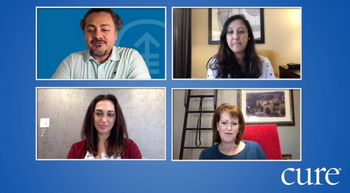
Watch Dr. Saad Z. Usmani, Dr. Krina K. Patel, Dr. Noa Biran, and Jenny Ahlstrom, answer audience Q&A during the CURE Educated Patient Multiple Myeloma Summit.
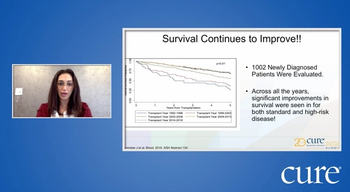
Watch Dr. Noa Biran, an associate professor of medicine in the division of multiple myeloma at The John Theurer Cancer Center at Hackensack University Medical Center, discuss treatment for relapsed/refractory myeloma.
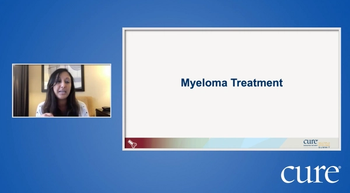
Watch Dr. Krina K. Patel, an associate professor and center medical director for the Department of Lymphoma-Myeloma at The University of Texas MD Anderson Cancer Center discuss treatment for newly diagnosed myeloma.

Watch Saad Z. Usmani, MD, MBA, with Carlyn Rose Tan, MD; Neha S. Korde, MD; and Kenny Capps answer audience Q&A during the CURE Educated Patient Multiple Myeloma Summit.
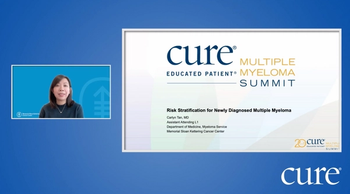
Watch Dr. Carlyn Rose Tan, an assistant attending in myeloma service at Memorial Sloan Kettering Cancer Center, present on risk stratification for newly diagnosed patients.